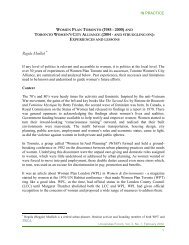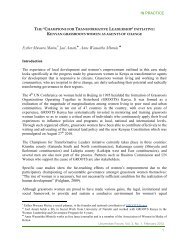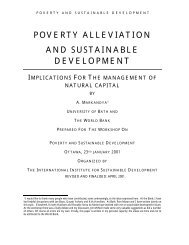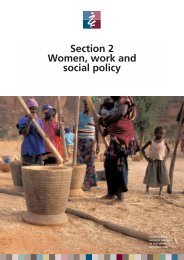The Cluster Initiative Greenbook
The Cluster Initiative Greenbook
The Cluster Initiative Greenbook
You also want an ePaper? Increase the reach of your titles
YUMPU automatically turns print PDFs into web optimized ePapers that Google loves.
Setting<br />
<strong>The</strong> environments where CIs occur vary considerably, but there are some strong recurring<br />
themes.<br />
Agree<br />
Disagree<br />
Policy to promote science and innovation<br />
76%<br />
Gov't policy is stable and predictable<br />
Industrial policy focus on regional/local levels<br />
Important decision makers at regional/local levels<br />
Gov't has initiated parallel Cis<br />
Forming CIs is considered helpful industry policy<br />
Companies trust gov't initiatives<br />
High trust in business relationships<br />
58%<br />
58%<br />
73%<br />
72%<br />
80%<br />
58%<br />
39%<br />
Figure 23<br />
<strong>Cluster</strong> initiative setting<br />
Dark green represents “Agree<br />
completely” and lighter greens<br />
lower levels of agreement.<br />
Dark red represents “Disagree<br />
completely” and lighter reds<br />
lower levels of disagreement.<br />
(See Figure 19.) <strong>The</strong> answer<br />
“Neither agree nor disagree” is<br />
not represented in the graph.<br />
Source: GCIS 2003<br />
National policy often has a science and innovation promotion component. Not everyone<br />
agrees though, that policy is stable and predictable, and there are also various<br />
degrees of decentralisation. In some countries industrial policy focuses more on the<br />
national level than on the regional or local level. This variation in decentralisation is also<br />
reflected in how important local government decision-makers are considered to be.<br />
In many countries, cluster initiatives are an established and respected part of the<br />
industrial policy and often groups of CIs are launched in parallel.<br />
<strong>The</strong> cultural setting also varies. Particularly interesting are aspects associated with<br />
social capital and trust. <strong>The</strong> trust companies have in government initiatives varies considerably<br />
from country to country. (See Figure 23.)<br />
Setting<br />
Objectives<br />
Process<br />
Performance<br />
<strong>The</strong> cluster served<br />
Although this survey covered cluster initiatives, each such initiative is aimed at a cluster<br />
or, in rare cases, several clusters.<br />
<strong>The</strong> survey shows that cluster initiatives are primarily set up in comparatively strong<br />
clusters. <strong>The</strong> clusters served by the cluster initiatives are typically considered to be more<br />
Agree<br />
Disagree<br />
One of region's more important clusters<br />
88%<br />
One of nation's more important clusters<br />
Int'ly competitive cluster<br />
Int'ly competitive buyers and suppliers<br />
Many companies in cluster<br />
65%<br />
66%<br />
65%<br />
64%<br />
Intense competition within cluster<br />
43%<br />
Thight buyer-supplier networks<br />
<strong>Cluster</strong> has long history<br />
Cartel-like cooperation<br />
35%<br />
33%<br />
9%<br />
Figure 24<br />
Characteristics of the cluster<br />
served by the cluster initiative<br />
Source: GCIS 2003<br />
<strong>The</strong> <strong>Cluster</strong> <strong>Initiative</strong> <strong>Greenbook</strong> • 35

















